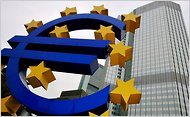 Arne Dedert/European Pressphoto AgencyThe European Central Bank in Frankfurt, Germany.
Arne Dedert/European Pressphoto AgencyThe European Central Bank in Frankfurt, Germany.
Despite efforts to strengthen the international banking industry, many of the world’s largest financial institutions still face the same pressures that confronted the sector after the collapse of Lehman Brothers in 2008, according to the Bank for International Settlements.
In its annual report, published on Sunday, the association of the world’s central banks said major international banks continued to be weighed down by investor skepticism about their future earnings and their ongoing reliance on government-backed financing.
The report said that to win back investor confidence, financial institutions should write down their underperforming assets and increase their cash reserves.
“Banks need to repair their balance sheets,” the B.I.S., based in Basel, Switzerland, said in its report. “This will entail writedowns of bad assets, thus imposing losses on banks’ stakeholders.”
Regulators worldwide have demanded that banks and other financial institutions clean up their balance sheets, but the firm still have a long way to go.
European financial institutions, for example, are currently trying to offload more than 2.5 trillion euros, or $3.1 trillion, of noncore loans, or roughly 6 percent of total European banking assets, according to the accounting firm PricewaterhouseCoopers.
The average ratio of loans to deposits for European institutions — a key measure of a firm’s exposure to bad loans — currently stands at 130 percent, sizably higher than the average of 75 percent for other banks worldwide, according to statistics from the B.I.S.
The association of central banks said that the Continent’s financial institutions remain too reliant on cheap, short-term loans provided by the European Central Bank, as many banks, particularly in Southern Europe, struggle to raise new funds from the capital markets.
“Many banks depend strongly on central bank funding and are not in a position to promote economic growth,” the B.I.S. report said.
The ongoing dependence by global financial institutions on wholesale funding will likely lead to continued high financing costs for banks for the foreseeable future, as investors demand larger amounts of collateral to protect against potential losses.
In Europe, where exposure to government debt has left financial institutions vulnerable, one-fifth of banks’ assets were set aside last year as a guarantee to obtain new financing, the B.I.S. said. Institutions in Southern Europe have been hit the hardest. The amount of assets used for collateral by Greek banks, for example, rose tenfold between 2005 and 2011, and currently stands at around 33 percent of total assets.
As banks reduce their exposure to risky assets in economies that are struggling amid the global economic slowdown, many firms have pulled back on lending to other financial institutions, particularly in overseas markets. The B.I.S. said that borrowing among banks in the euro zone fell drastically between 2008 and 2011, as local firms reduced their international lending by 43 percent over the period.
Government “debt holdings are an important drag on banks’ efforts to regain the trust of their peers and the markets at large,” the B.I.S. report said. “Exposures to sovereigns on the euro area’s periphery are perceived as carrying particularly high credit risk.”
Article source: http://dealbook.nytimes.com/2012/06/24/amid-debt-crisis-banks-confronted-by-familiar-problems/?partner=rss&emc=rss